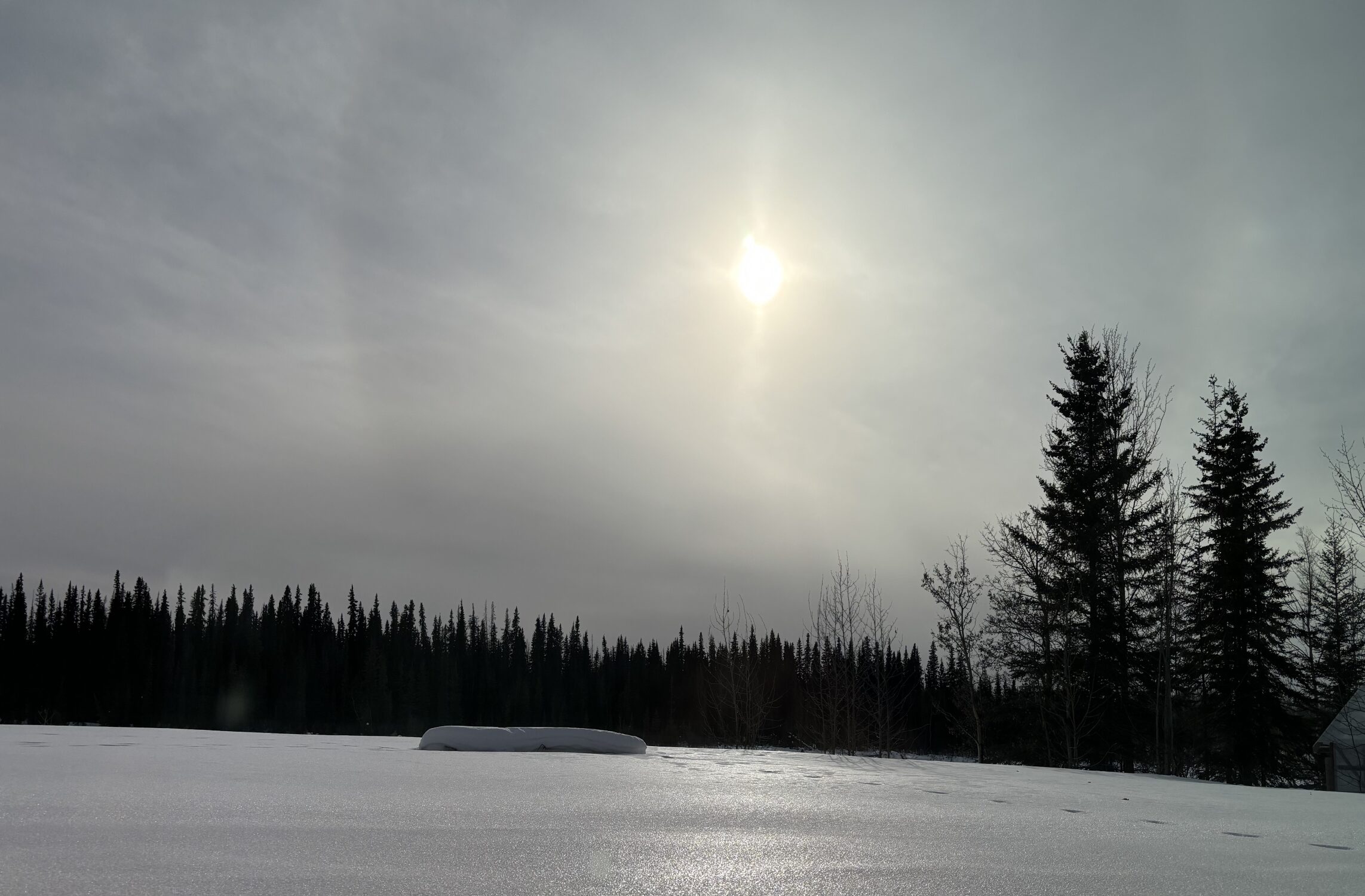Sugarcane
 A solar halo above Lower Post, BC. Home to the community of Daylu Dena Council, and the historical site of the Lower Post Residential School.
A solar halo above Lower Post, BC. Home to the community of Daylu Dena Council, and the historical site of the Lower Post Residential School.
One evening during the Fall of 2017, a group of Red Cross staff, volunteers, and support personnel sat together in a large circle. They were debriefing, disclosing difficult reflections within an eerily empty reception center. The site of general chaos and noise only a few hours ago, the location – a quarter of a mall under renovation temporarily repurposed into a hall for evacuee support – held a taunting peace.
The group was not, however, discussing the fires. They were not talking about their empathy bandwidth (the constant strain of taking on the evacuees’ trauma), or the stress of managing the response, or even their fatigue after another long day with little rest. In fact, the workday had been a shorter one. It had ended early to allow everyone to participate in a mental health workshop. One after another, each person held a talking stick, answering open prompts on personal or professional pain points. In each other and through this exercise, they found some strength, validation, and motivation.
One individual told the story of how she had doubted herself constantly. How, despite her proven capability and resilience, she struggled with truly believing in herself. How she felt that everyone who held her up was doing twice the work. How she felt inadequate. A surprising revelation to most of us as she was our go-to for some of the toughest cases; a knowledgeable, calm presence who was able to make the appropriate connections and decisions without hesitation. Compassion personified.
The underlying reason for these undying feelings of insufficiency, she understood, were intergenerational trauma. She had barely escaped the residential school system in her youth. Her mother had already lost a child to the system when the RCMP knocked at her door for a second time. Mom hid her away and told the police there was no one to surrender. They searched the home, failed to find any minors, and left. As a result, she was able to grow up free from the traumas of residential schools, unlike her parents. Unfortunately, she continued to carry some of the insecurities and fears that her family held – about themselves, institutions, and their communities.
Stories like this, and the immediacy of the accounts surrounding residential schools, were unknown to me until adulthood. Elementary and secondary school education in BC during the 2000s did not spend too much time on increasing awareness of Indigenous history or state and settler roles in brutal suppression of cultures and communities that flourished in the pre-colonial era. While things are improving, the collective conscious is taking too much time in coming to terms with this country’s true record.
So it is incumbent on all of us who now call this land home to learn, acknowledge, and understand the ongoing impacts of its history. Part of that ongoing effort is to give time to Indigenous stories, culture, and people.
The place where we were gathered that day in 2017 was on the upper floor of Boitanio Mall in Williams Lake. Just a short drive South is Williams Lake First Nation (WLFN), home to the T’exelcemc people of the Secwépemc Nation. WLFN’s IR 1, also known as Sugarcane, was the historical site of St. Joseph’s Indian Residential School, one of eighteen that operated across BC.
Not long after the now infamous announcement of grave sites discovered by the Tk’emlúps te Secwépemc First Nation, other communities began undertaking their own searches for lost remains of lives ended too early. In 2023, I watched the livestream from an office in Prince George as Chief Willie Sellars announced the discovery of unmarked graves at the St. Joseph’s site. The survey of only a small area of the school grounds quickly discredited official estimates, further spurring similar projects elsewhere. A reckoning with the past, accelerated by Canada’s Truth and Reconciliation Commission, was finally gaining traction among the public.
In 2024, Sugarcane, a documentary on St. Joseph’s legacy and the context within which the WLFN community members live, was released:
Note: Sugarcane can be streamed on Disney+ in Canada and Hulu in the United States.
St. Joseph’s Mission closed in 1981. Many survivors and their families continue to feel its presence today. The film captures their stories, reflections, and acts of defiance in the face of institutional disregard or vehemence. Within the heartbreak and discomfort, there are sanguine threads that emerge. Stories heard, read, and understood imbue in their audience a growing power. One that can heal indiscriminately.
Over the past nine years, I have had the chance to visit five residential school sites in BC, from the Southeast Interior to the Northernmost community in the province. I have heard Elders, Chiefs, community leaders, parents, and youth share their perspectives on what Reconciliation means to them. Equality, equity, social justice, reparations, revitalization of language and culture, opportunity, institutional or legal reform – there is no one path, only a moving tapestry that remains unfinished.
Films like Sugarcane offer all of us a chance to pause and listen. These stories represent the underrepresented; those neglected by a society of shared vision and values declared but not upheld. We cannot take them lightly.
– / – / –
Since the time of those formative fires eight Autumns ago, I have moved between Secwépemc, Musqueam, Squamish, Tsleil-Waututh, and Lheidli T’enneh territory. In following years, stories have continued to emerge of Canada’s ugly past, buoyed by oral accounts, found documents, and yes, many mass graves. Let us take time to participate in this collective remembrance. Lest we forget; for many, there is no choice.
Signing off from somewhere in the North, within the traditional and unceded lands of the Lheidli T’enneh.